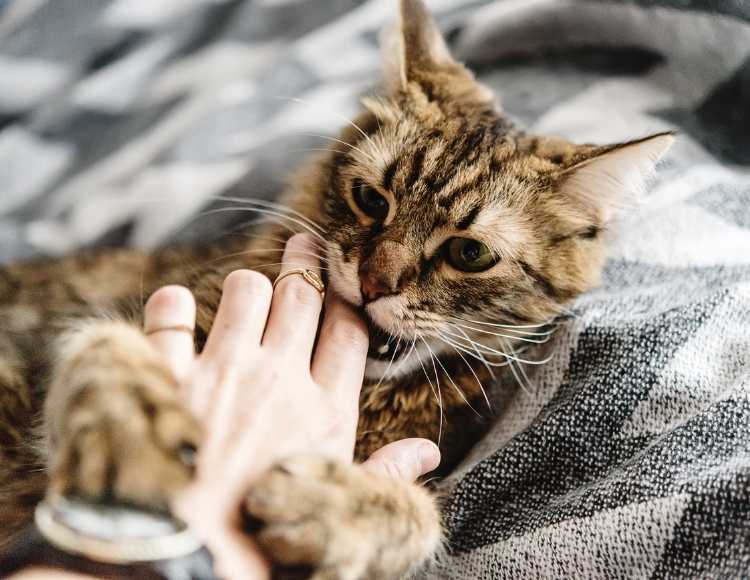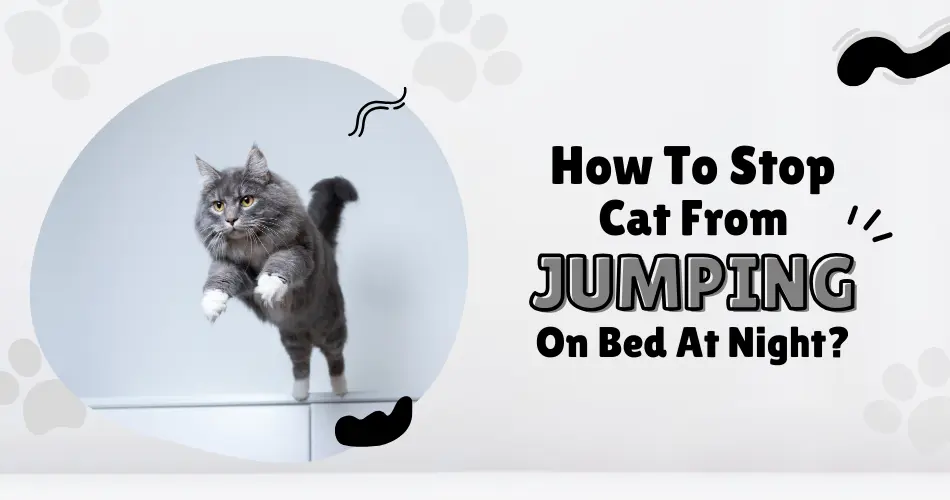Does your cat constantly jump on the bed at night? She may want to play on the bed, eat food, or get cuddle time when you are preparing to sleep or sleeping. Your cat is most likely craving attention, which is disrupting your sleep cycle. If your cat keeps jumping, it becomes a problem for you.
A restful night’s sleep is critical to your health and should not be disturbed by your cat. There’s no need to suffer from sleep loss caused by cats.
We’ll explain why your cat might be jumping on the bed at night and how to handle the problem.
Why Is My Cat Jumping On My Bed At Night?
Cats are nocturnal species in their natural surroundings. They sleep almost the entire day and play or hunt at night. There are some common reasons your cat might jump on the bed when you are sleeping at night. They are:
- It may need to be enjoying more stimulation, enrichment sessions, and exercise during its active hours. So when you’re starting to fall asleep, your cat may be wide awake and ready to play.
- If your cat spends the majority of its active time at home alone while you are at work or elsewhere, it may be lonely and depressed.
- When your cat is hungry, thirsty, or wants some snacks at midnight.
- The bedding or litterpan of your cat has been disrupted.
- Your cat’s schedule is no longer parallel with yours.
Along with these reasons, your cat may enjoy jumping on the bed at night. However, this behavior is not a serious behavioral issue for your cat. But it may cause serious harm to both of you and your kitty. So, you should train your cat to stop jumping on the bed at night.
How to Stop Cat from Jumping on Bed at Night
Cats are known for their nocturnal antics. They also love to jump by nature. Even they jump on TV, tables, and everywhere. But when their nighttime escapades disrupt your sleep by jumping on the bed, it can become quite a challenge.
Fortunately, there are several effective strategies to stop this behavior and ensure both you and your feline friend enjoy peaceful nights. They are:
Comfortable Sleeping Environment For Your Cat
For the first step, you should focus on your cat’s sleeping environment. It may be the main reason for this kind of behavior. So, you should provide appealing and comfortable bedding to deter your cat from jumping on your bed at night.
To make them feel comfortable, you can set up a soft, warm, and cozy sleeping spot near your bed. You can use a plush cat bed, blankets, or a comfortable box. Cats have a natural attraction to warmth and comfort, and they are so self-aware.
So, creating a cozy space nearby can entice them to choose this designated sleeping area over your bed.
Close Your Bedroom Door When You Go to Sleep
A straightforward solution to prevent your cat from jumping on your bed at night is to close your bedroom door. By doing so, you create a physical barrier that keeps your cat out of your bedroom during nighttime hours.
Over time, your cat may learn that your bedroom is off-limits when the door is closed. It helps to establish a boundary and maintain a peaceful sleep environment for both you and your feline companion.
Providing Evening Exercise
One effective way to discourage your cat from jumping at night is to engage them in physical exercise during the evening hours. Cats are crepuscular, which means they are most active at dawn and dusk.
You can play with your cat in the evening and help them expend excess energy. It will reduce their urge to be active at night when you’re trying to sleep.
Interactive play sessions with toys like feather wands or laser pointers are also great options to stimulate your cat and encourage them to sleep peacefully during the night.
Positive Reinforcement and Training
Positive reinforcement and training techniques can be valuable techniques in stopping your cat’s habit of jumping on your bed at night. Whenever your cat chooses to rest in their designated sleeping area rather than on your bed, offer rewards. You can give treats, praise, and gentle petting.
For these behaviors, your cat will associate staying in their chosen spot with positive experiences. It makes them more likely to continue this behavior. Consistency and patience are key when using positive reinforcement to shape your cat’s nighttime habits.
Establishing a Bedtime Routine

Cats thrive on routine and predictability. You can establish a consistent bedtime routine for your cat. Regularly, you can signal to your cat that it’s time to wind down and sleep. This routine can include activities like feeding, followed by a playtime session, and ending with a final bedtime treat in their allotted sleeping area.
Within some days, your cat will cope with these activities at bedtime and be more inclined to settle down in their cozy spot rather than jumping on your bed when it’s time to sleep.
Adopt Another Cat to Keep Her Company
You can consider adding another cat to the household if your cat’s evening restlessness appears to be caused by loneliness or separation anxiety. A feline companion can provide both social interaction and companionship.
It may reduce the need for your cat to seek your bed for comfort. However, keep in mind that introducing a new cat to your home should be done gradually and under the guidance of a veterinarian or animal behaviorist. You have to ensure a harmonious transition and prevent potential conflicts between the cats.
Consult a Veterinarian

If your cat’s nighttime behavior changes suddenly or appears to be linked to health issues, it’s essential to seek professional guidance. A veterinarian can check up on your cat’s overall health. They can address any potential medical problems that might be causing the change in behavior.
There are some conditions, such as pain, discomfort, crying like a baby, or underlying medical issues that can lead to restlessness at night. A vet can provide the appropriate treatment and advice to help these concerns and restore your cat’s peaceful nighttime behavior.
Consulting a Professional Trainer
If your cat’s nighttime behavior remains challenging to address, it will be better to consult a professional animal behaviorist or trainer. It is a valuable step; otherwise, you may suffer.
These experts specialize in understanding animal behavior. They can provide personalized guidance and training techniques for your cat’s specific needs.
By working with a professional, you can develop a customized plan to address the issue of your cat jumping on the bed at night effectively. You may also create a relaxing sleeping environment for both you and your feline partner.
FAQ
Is it okay to let my cat sleep on the bed with me?
It is a personal preference to allow your cat to sleep on the bed with you. Many cat owners enjoy the companionship and comfort of sharing their bed with their feline friends. However, if your cat’s nighttime activities disrupt your sleep or if you have allergies, you may not choose your cat to sleep with you.
Is it necessary to consult a veterinarian for this issue?
If your cat’s nighttime behavior change is sudden, persistent, or appears to be related to health issues, it is advisable to consult a veterinarian.
What’s the best way to discourage my cat from jumping on the bed?
The best way to discourage your cat from jumping on the bed at night is to create a comfortable alternative sleeping space and close your bedroom door when you go to sleep.
Final Thought
Your cat’s nighttime habit of jumping on your bed is a manageable challenge with the right strategies. By creating a comfortable sleeping environment for your feline friend, providing alternatives, and engaging in positive reinforcement, you can encourage them to respect your sleep space.
Remember that you must be patient and constant in your efforts. If you encounter unusual behavior changes or suspect underlying health issues, consulting a veterinarian is crucial.
After these, if you can’t control your cat’s behavior challenges, you should get help from a professional trainer. They can provide specific solutions. With these methods, you can enjoy peaceful nights while ensuring the well-being of your beloved cat.

